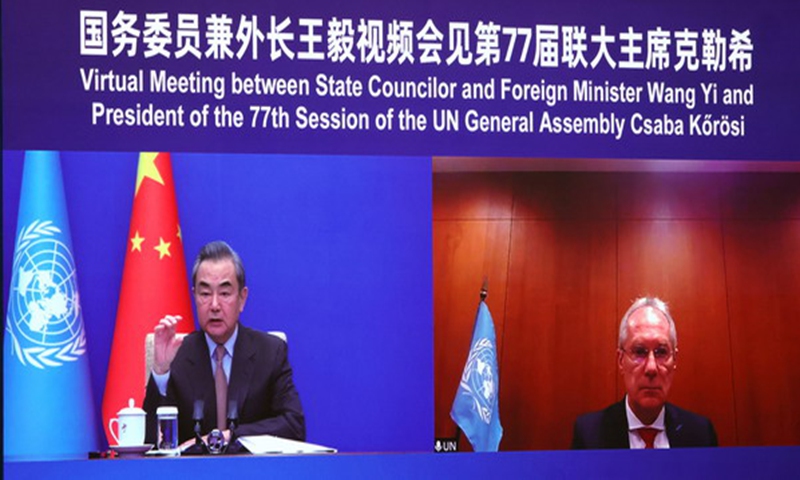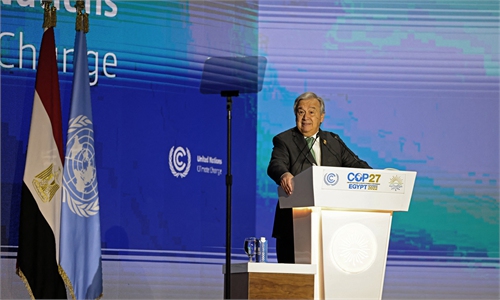China stays committed to following a green, low carbon and sustainable path, says FM when meets with UNGA president

Photo: Chinese Foreign Ministry
China will continue to participate in international cooperation on climate change and make positive contributions to the success of the 27th session of the Conference of the Parties (COP27) to the United Nations Framework Convention on Climate Change (UNFCCC), said Chinese State Councilor and Foreign Minister Wang Yi on Monday when he met via video link with Csaba Korosi, president of the 77th session of the United Nations General Assembly (UNGA).
Wang said that China would provide support and help to developing countries within its utmost abilities and make positive contributions to the success of COP27 which kicked off on Sunday in Egypt.
As China holds the presidency of the 15th meeting of the Conference of the Parties to the Convention on Biological Diversity, known as COP15, which is set to begin on December 7, Wang said China would work with parties to well organize the second part of COP15 and make COP15 a success.
Wang said Chinese modernization pursues the harmony between human and nature, and China stays committed to following a green, low carbon and sustainable path.
China is also ready to strengthen exchanges and cooperation on water resources with other countries through the implementation of the Global Development Initiative, Wang added.
Also, the Chinese foreign minister said that in the process of building a modern socialist country in an all-round way, "we will take a more active part in the reform and development of the global governance system, practice the global governance concept of extensive consultation, joint contribution and shared benefits, adhere to true multilateralism, and continuously deepen cooperation with the UN, and make greater contributions to the international community's response to common challenges."
Noting China always supports the cause of the UN and the important role of the UNGA, Wang said that in the face of the chaos in the world, China will firmly uphold the international system with the UN at its core, the international order based on international law, and the basic norms of international relations based on the purposes and principles of the UN Charter.
Facing the adverse current of anti-globalization, China advocates adhering to the right direction of economic globalization, opposes "building barriers" and "decoupling and breaking chains," Wang stressed. He noted that China is committed to building an open world economy, and promoting common global development.
In the face of ideological confrontation, China advocates respect for each country's independent choice in deciding its human rights and its democratic development path, and opposes wanton interference in other countries' internal affairs.
Facing the conflict of civilizations theory and power politics, China calls for promoting the common values of all mankind, respecting the diversity of world civilizations, and transcending civilizational barriers through exchanges of civilizations, and transcending civilizational conflicts through mutual learning among civilizations.
Korosi conveyed felicitations on the successful convening of the 20th National Congress of the Communist Party of China, and expressed expectation on strengthening cooperation with China to make COP27 a success and help vulnerable countries cope with challenges in regards to water utilization and management.
Korosi also expressed willingness to support China's efforts and promote the second wave of meetings of COP15 to realize positive outcomes.
The two sides also exchanged views on the Security Council reform and other issues.
While including climate compensation into the formal agenda of COP27 for the first time at global climate talks is considered a breakthrough, China's special envoy for climate change said Wednesday that China strongly supports claims from developing countries, especially the most vulnerable countries, for claiming loss and damage compensation. However, setting up a mechanism is a priority, which should follow the principle of common but differentiated responsibilities.
Despite the progress, some countries have lobbed accusations at each other, urging developing countries such as China and India to do more in compensating others. During a press conference on Wednesday, China's Special Envoy for Climate Change Xie Zhenhua said the biggest difference is that some countries support the amounts of compensation being suggested, but others are against it. They also disagree on how the loss and damage compensation should be funded.
"We hope we can find a good result through negotiations at this dialogue," Xie said.
No matter how the external environment changes, China's firm determination and position to implement its goals to peak carbon emissions and achieve carbon neutrality, and to actively participate in global climate governance will never change, Xie said in an address on Tuesday.
"China has actively implemented the Paris Agreement and further enhanced its nationally determined contribution, aiming to reach carbon peak and achieve carbon neutralization in a strong, orderly and effective manner. China has made great progress in this regard," said Xie.
Global Times

